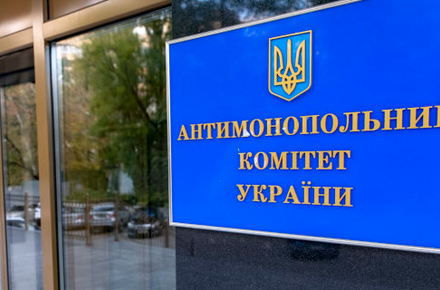The AMCU fined 14 companies UAH 23.4 million for bid rigging. And this is not the biggest fine
27 December 2024 16:56
The Antimonopoly Committee has recognized 14 companies as participants in collusive bidding held by the state-owned enterprise Pivdennyi Commercial Sea Port and fined them a total of UAH 23.4 million. This was reported by the AMCU press service, "Komersant Ukrainian" reports.
Among the conspirators who committed violations in the form of anticompetitive concerted actions related to the distortion of bidding results are Millennium Meritime LLC (now called Radena 2020 LLC), Technosolution LLC, Yuzhmorservice LLC, SV Shipping Ltd, Marin Industrial Service LLC, Alur Group LLC, Entero LLC, Inzhportservice LLC, Techmorsnab LLC, Budkomplekt 14 LLC, Metcom Group LLC, VFC Oblzbut LLC, Import Partners Trade LLC, Mining Elevator Machinery LLC.
The above-mentioned business entities participated in 34 tenders held by the state-owned enterprise Pivdennyi Commercial Sea Port for the purchase of equipment, spare parts for machinery and materials with an expected value of over UAH 195 million.

During the case consideration, the Committee found that the defendants coordinated their behavior in order to eliminate competition between them.
How often does the AMC expose anticompetitive agreements
Such cases become the subject of investigations and decisions of the Antimonopoly Committee quite often. However, the amount of fines imposed and the number of conspirators should probably attract special attention. If we evaluate the results of the AMCU’s proceedings over the past two weeks, the 14 companies participating in the bidding held by Pivdennyi port can be distinguished in terms of the number of conspirators. However, in terms of the amount of the fine, this case is not even in the top three.
So, the rating of violators of the last two weeks by the amount of fines is as follows:
1st place. A fine of UAH 48 million imposed by the AMCU on diesel fuel suppliers – Century Group LLC and Fuelpostach LLC – to state customers for collusion and distortion of the results of 24 tenders.
2nd place. A fine of over UAH 51.5 million. Stellar Lim 2024 LLC (during the bidding and auction the name was Tradelim LLC) and Steyland LLC were penalized by the AMCU for collusion during participation in 2 diesel fuel procurement tenders held by Kyivpastrans and an auction for the sale of an oil depot.
1st place. A fine of UAH 106 million. It was imposed by the Antimonopoly Committee on Construction Management of Mechanization LLC and Bridge Construction Detachment No. 112 LLC, which, according to the AMCU, colluded in 10 procurements of services for overhaul and reconstruction of overpasses, bridges and roads conducted in 2019-2021 by road services in Vinnytsia, Kirovohrad, Rivne, Zhytomyr regions, as well as the State Enterprise Agency of Local Roads for a total amount of over UAH 600 million.
By the way, the Antimonopoly Committee’s website contains the State Register of Business Entities Prosecuted for Violations in the Form of Anti-Competitive Concerted Actions Concerning the Distortion of the Results of Trades, Auctions, Competitions, and Tenders. This register has been regularly updated for 4 years, starting from 12/28/2021. It now contains 1840 entries.

What is an anticompetitive agreement?
As Dmytro Korablyov, a lawyer at Zakupki.Prom.ua, explains on the Yurydychna Gazeta Online website, collusion is anticompetitive concerted actions that have led or may lead to the prevention, elimination or restriction of competition. Such actions are prohibited and entail liability. According to the lawyer, not only procedures in the Prozorro system, but also auctions and tenders can be the subject of collusion, even in areas where the state is not involved. The body that regulates such actions is the Antimonopoly Committee of Ukraine.
Also, as the expert explains, each procedure in which there was collusion is a separate violation. That is, they are fined for all proven violations. Everyone involved in the conspiracy is a defendant. However, it is not necessary to win the procurement to be held liable. Even if the tender is canceled, participants can be fined.
There are two types of conspiracies. Classic, where there is a real player and a technical one. That is, two participants agree with each other: “We come to the tender together, you lose, and I win.” There is also a reverse collusion, when participants simply divide procurement among themselves. The second method is harder to detect and prove. However, as the lawyer reminds us, the AMCU has quite serious powers to request information, as well as the ability to conduct on-site inspections.
As in any violation, there must be signs in cases of collusion. Below is a partial list of signs of anticompetitive concerted actions in the form of tender result distortion:
identical documents or parts thereof;
synchronization of actions in time;
confusion of seals/signatures;
common IP address, office, means of communication;
common founders, managers, employees, notaries, etc;
lack of victories;
constant joint participation of the same participants;
shared printers/scanners;
refusal to win;
consecutive serial numbers;
family ties;
providing financial assistance to each other and having a stable business relationship;
joint preparation of estimates or the same calculation system.
At the same time, some signs cannot serve as independent evidence. They must be present in conjunction with others.









